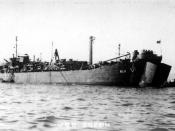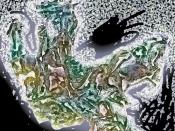Classical Tragic Heroes
Based on Aristotle's sightings, it is evident that in Greek tragedy, there are characters that are more tragic than others. This is based on different characteristics that Aristotle has come up with by analysing different plays. In RexWarner's "Prometheus" and E.F. Watling's "Antigone", one character is observed as a more tragic hero than others. Creon is a far more tragic character than Prometheus due to the magnitude of his physical punishment, the poignant punishment he endures, and his plummet from prosperity to adversity.
Creon can be considered to be a more tragic character than Prometheus due to the magnitude of his punishment. Prometheus's actions have led to many universal implications. Zeus orders Hephaestus to strap chains around Prometheus' body and attach Prometheus along with the chains to a mountain. "The task of making these massive chains...was given to Hephaestus...of so torturing a brother god" (Warner 5).
As he sees his brother god, Prometheus experiencing punishment, Hephaestus feels terrible. This is a grave punishment for Hephaestus as well because he in his mind refuses to chain Prometheus but refuses to contravene his superior god, Zeus at the same time. Similarly, Creon's punishment has created major universal implications and problems as well. Creon has lost his whole family due to his arrogant behaviour in the past. "My child here in my arms...and there, the other...The son...The mother..." (Watling 16). His son and wife have committed suicide because of his need to maintain power.
His punishment for Antigone causes his son to take his life, which results in his wife to kill herself. His actions lead to Thebes losing almost the entire royal family and consequently being left without a ruler. His punishment is very serious as it causes his family to suffer and die. Therefore, as a...


